HNC Unit 3: Professional Identity and Practice Development Report
VerifiedAdded on 2023/01/12
|11
|2764
|57
Report
AI Summary
This report, focusing on professional identity and practice, explores the importance of ongoing professional development and self-directed learning within the context of a career as a manager at Hilton. It examines the benefits of professional development for different stakeholders, including employees and employers, and investigates employer expectations of skills and competencies. The report includes a self-assessment of the student's abilities, skills, and competencies using frameworks like SWOT analysis, skills audits, and Belbin team roles. It also reviews various learning theories and approaches, such as discovery learning, GOMS model, and emotional intelligence, and culminates in the construction of a detailed professional development plan designed to enhance chosen skills and competencies within the specific work context of a Hilton manager role. The plan outlines current proficiency levels, targeted proficiency, and resources needed for development, focusing on teamwork and communication skills.
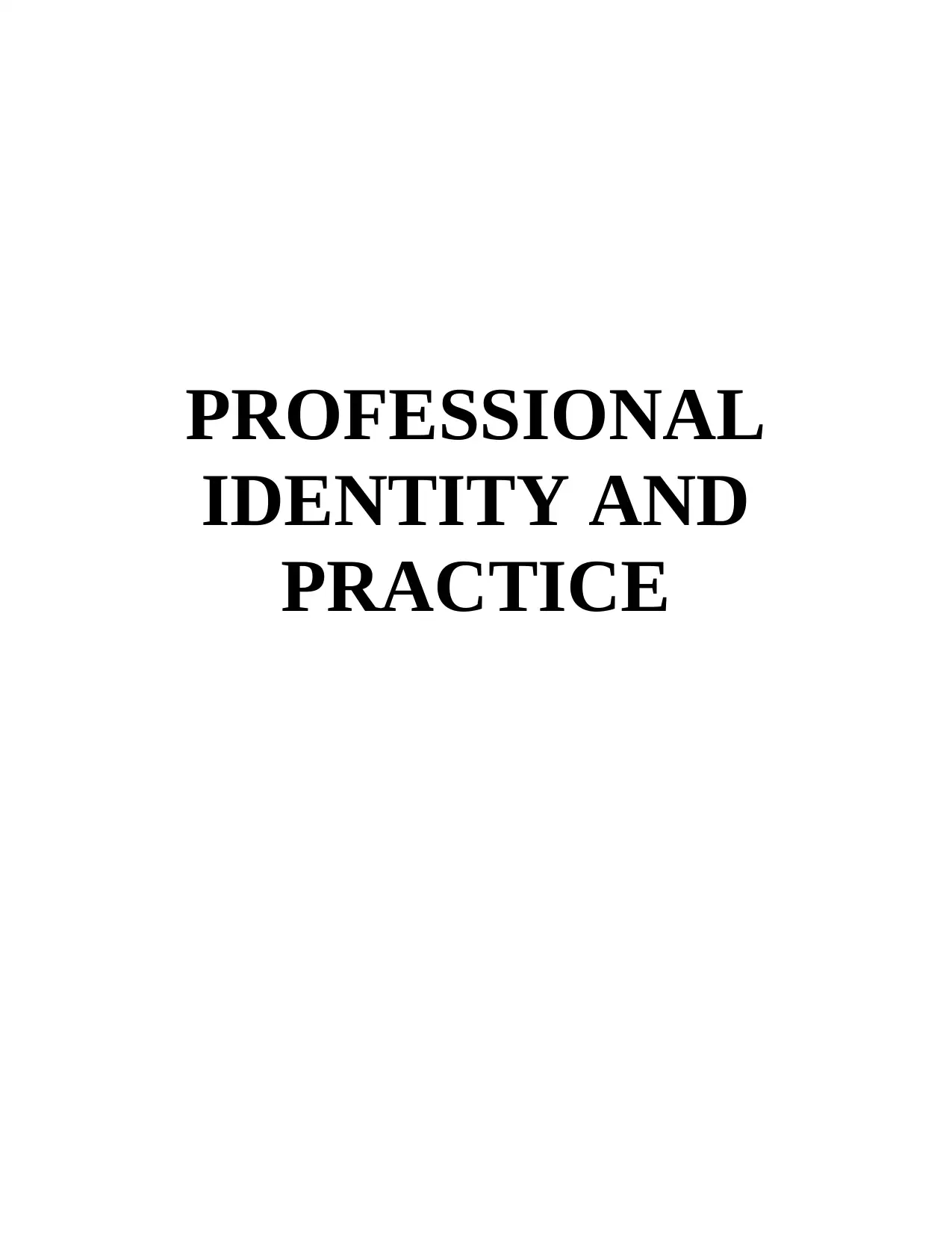
PROFESSIONAL
IDENTITY AND
PRACTICE
IDENTITY AND
PRACTICE
Paraphrase This Document
Need a fresh take? Get an instant paraphrase of this document with our AI Paraphraser
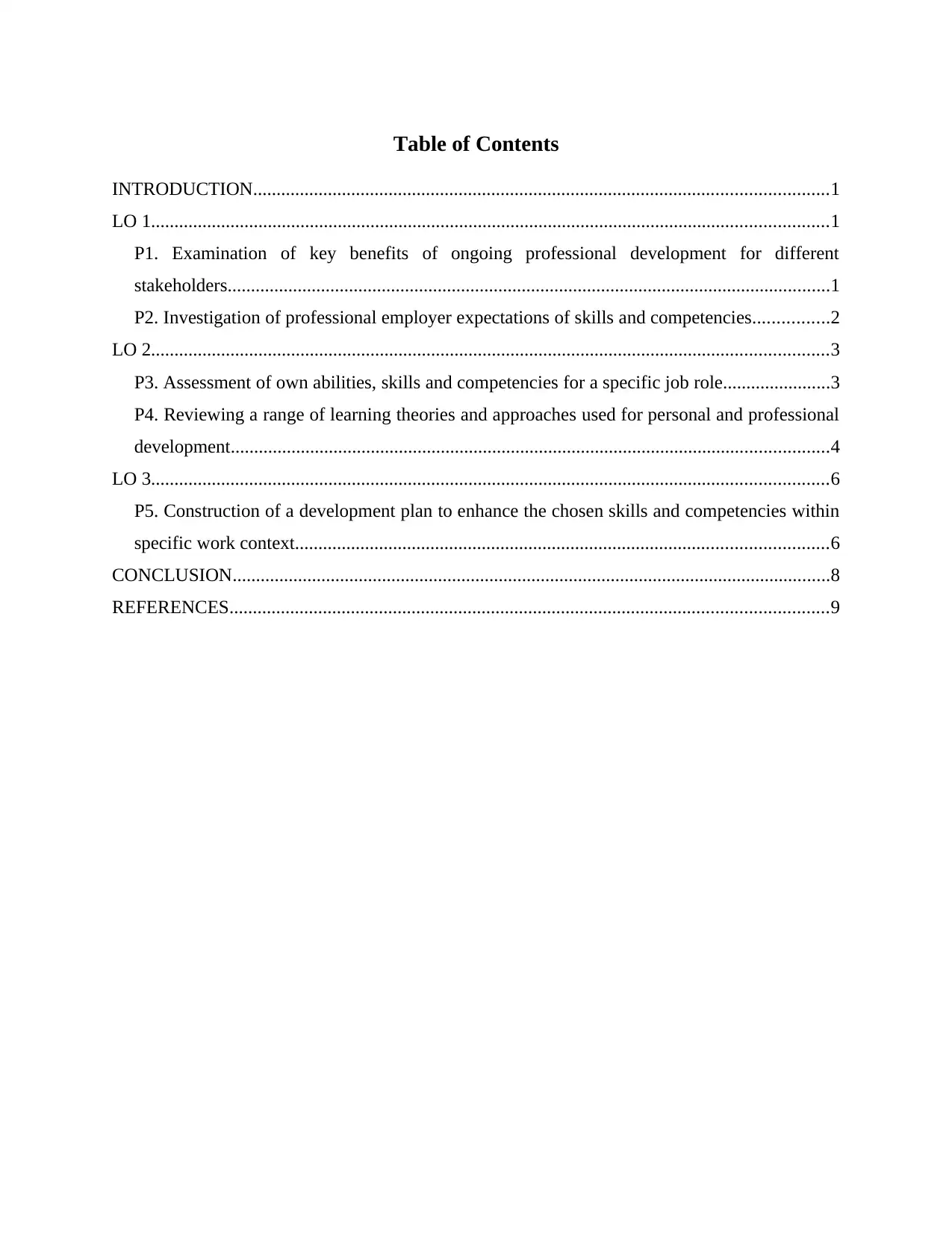
Table of Contents
INTRODUCTION...........................................................................................................................1
LO 1.................................................................................................................................................1
P1. Examination of key benefits of ongoing professional development for different
stakeholders.................................................................................................................................1
P2. Investigation of professional employer expectations of skills and competencies................2
LO 2.................................................................................................................................................3
P3. Assessment of own abilities, skills and competencies for a specific job role.......................3
P4. Reviewing a range of learning theories and approaches used for personal and professional
development................................................................................................................................4
LO 3.................................................................................................................................................6
P5. Construction of a development plan to enhance the chosen skills and competencies within
specific work context..................................................................................................................6
CONCLUSION................................................................................................................................8
REFERENCES................................................................................................................................9
INTRODUCTION...........................................................................................................................1
LO 1.................................................................................................................................................1
P1. Examination of key benefits of ongoing professional development for different
stakeholders.................................................................................................................................1
P2. Investigation of professional employer expectations of skills and competencies................2
LO 2.................................................................................................................................................3
P3. Assessment of own abilities, skills and competencies for a specific job role.......................3
P4. Reviewing a range of learning theories and approaches used for personal and professional
development................................................................................................................................4
LO 3.................................................................................................................................................6
P5. Construction of a development plan to enhance the chosen skills and competencies within
specific work context..................................................................................................................6
CONCLUSION................................................................................................................................8
REFERENCES................................................................................................................................9
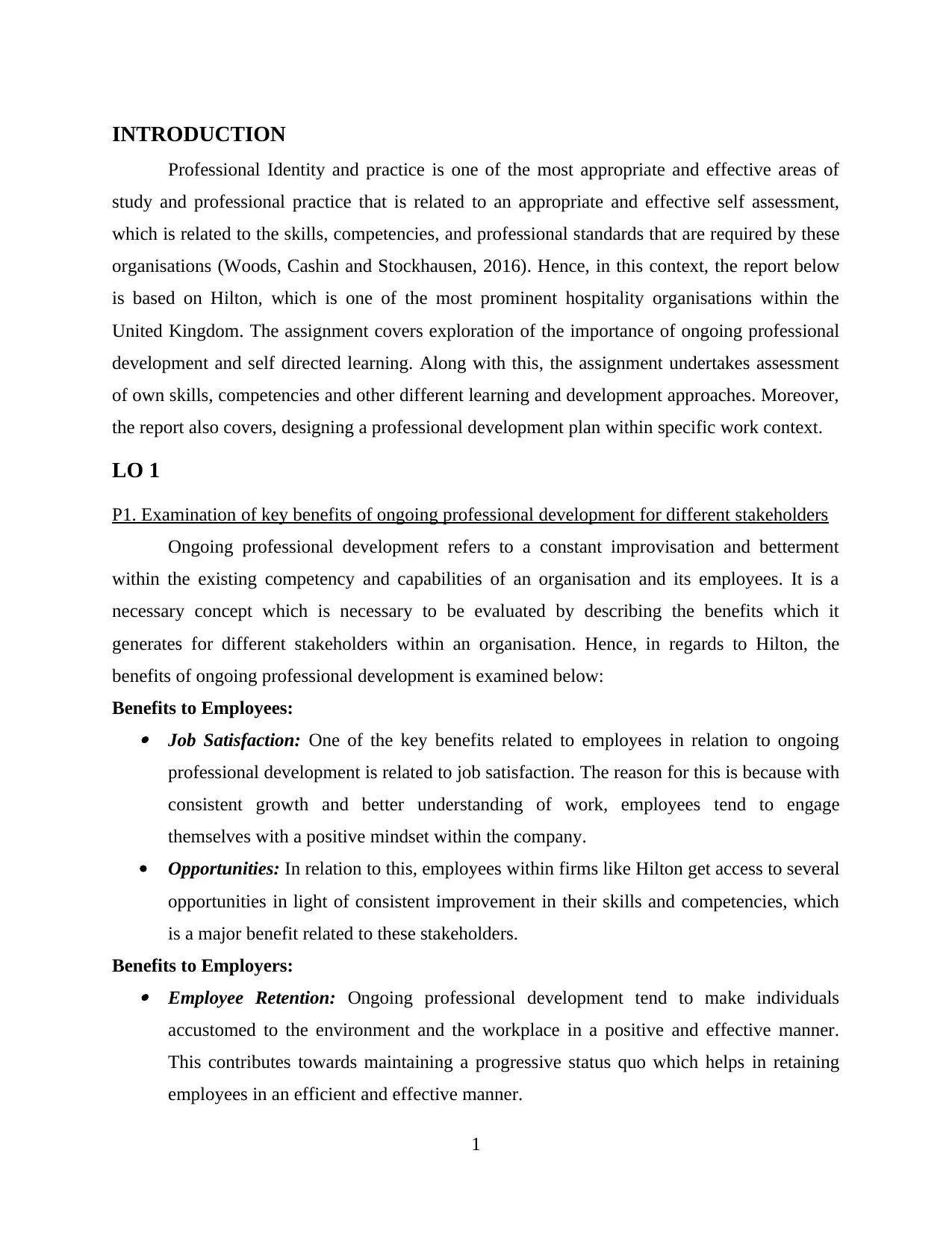
INTRODUCTION
Professional Identity and practice is one of the most appropriate and effective areas of
study and professional practice that is related to an appropriate and effective self assessment,
which is related to the skills, competencies, and professional standards that are required by these
organisations (Woods, Cashin and Stockhausen, 2016). Hence, in this context, the report below
is based on Hilton, which is one of the most prominent hospitality organisations within the
United Kingdom. The assignment covers exploration of the importance of ongoing professional
development and self directed learning. Along with this, the assignment undertakes assessment
of own skills, competencies and other different learning and development approaches. Moreover,
the report also covers, designing a professional development plan within specific work context.
LO 1
P1. Examination of key benefits of ongoing professional development for different stakeholders
Ongoing professional development refers to a constant improvisation and betterment
within the existing competency and capabilities of an organisation and its employees. It is a
necessary concept which is necessary to be evaluated by describing the benefits which it
generates for different stakeholders within an organisation. Hence, in regards to Hilton, the
benefits of ongoing professional development is examined below:
Benefits to Employees: Job Satisfaction: One of the key benefits related to employees in relation to ongoing
professional development is related to job satisfaction. The reason for this is because with
consistent growth and better understanding of work, employees tend to engage
themselves with a positive mindset within the company.
Opportunities: In relation to this, employees within firms like Hilton get access to several
opportunities in light of consistent improvement in their skills and competencies, which
is a major benefit related to these stakeholders.
Benefits to Employers: Employee Retention: Ongoing professional development tend to make individuals
accustomed to the environment and the workplace in a positive and effective manner.
This contributes towards maintaining a progressive status quo which helps in retaining
employees in an efficient and effective manner.
1
Professional Identity and practice is one of the most appropriate and effective areas of
study and professional practice that is related to an appropriate and effective self assessment,
which is related to the skills, competencies, and professional standards that are required by these
organisations (Woods, Cashin and Stockhausen, 2016). Hence, in this context, the report below
is based on Hilton, which is one of the most prominent hospitality organisations within the
United Kingdom. The assignment covers exploration of the importance of ongoing professional
development and self directed learning. Along with this, the assignment undertakes assessment
of own skills, competencies and other different learning and development approaches. Moreover,
the report also covers, designing a professional development plan within specific work context.
LO 1
P1. Examination of key benefits of ongoing professional development for different stakeholders
Ongoing professional development refers to a constant improvisation and betterment
within the existing competency and capabilities of an organisation and its employees. It is a
necessary concept which is necessary to be evaluated by describing the benefits which it
generates for different stakeholders within an organisation. Hence, in regards to Hilton, the
benefits of ongoing professional development is examined below:
Benefits to Employees: Job Satisfaction: One of the key benefits related to employees in relation to ongoing
professional development is related to job satisfaction. The reason for this is because with
consistent growth and better understanding of work, employees tend to engage
themselves with a positive mindset within the company.
Opportunities: In relation to this, employees within firms like Hilton get access to several
opportunities in light of consistent improvement in their skills and competencies, which
is a major benefit related to these stakeholders.
Benefits to Employers: Employee Retention: Ongoing professional development tend to make individuals
accustomed to the environment and the workplace in a positive and effective manner.
This contributes towards maintaining a progressive status quo which helps in retaining
employees in an efficient and effective manner.
1
⊘ This is a preview!⊘
Do you want full access?
Subscribe today to unlock all pages.

Trusted by 1+ million students worldwide
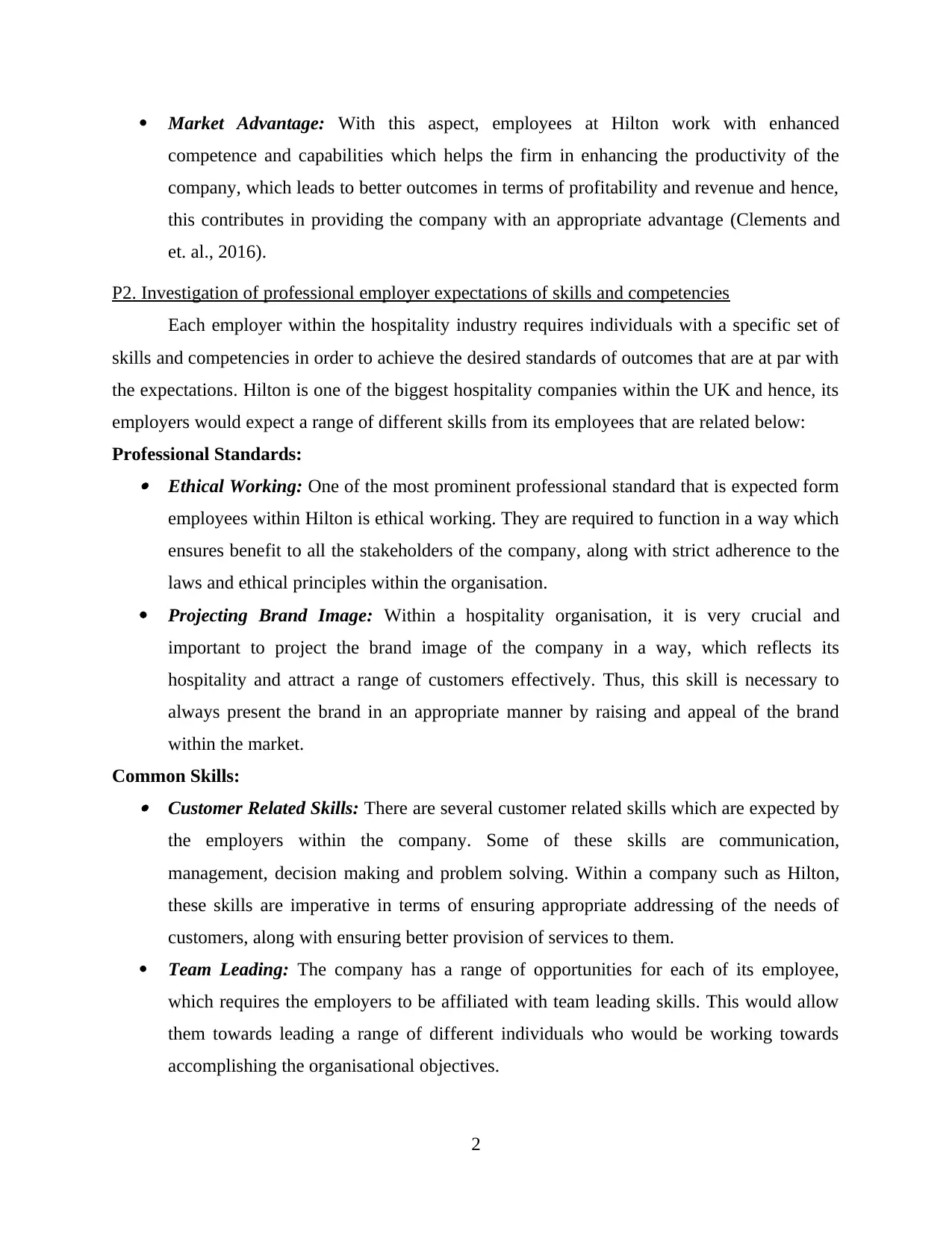
Market Advantage: With this aspect, employees at Hilton work with enhanced
competence and capabilities which helps the firm in enhancing the productivity of the
company, which leads to better outcomes in terms of profitability and revenue and hence,
this contributes in providing the company with an appropriate advantage (Clements and
et. al., 2016).
P2. Investigation of professional employer expectations of skills and competencies
Each employer within the hospitality industry requires individuals with a specific set of
skills and competencies in order to achieve the desired standards of outcomes that are at par with
the expectations. Hilton is one of the biggest hospitality companies within the UK and hence, its
employers would expect a range of different skills from its employees that are related below:
Professional Standards: Ethical Working: One of the most prominent professional standard that is expected form
employees within Hilton is ethical working. They are required to function in a way which
ensures benefit to all the stakeholders of the company, along with strict adherence to the
laws and ethical principles within the organisation.
Projecting Brand Image: Within a hospitality organisation, it is very crucial and
important to project the brand image of the company in a way, which reflects its
hospitality and attract a range of customers effectively. Thus, this skill is necessary to
always present the brand in an appropriate manner by raising and appeal of the brand
within the market.
Common Skills: Customer Related Skills: There are several customer related skills which are expected by
the employers within the company. Some of these skills are communication,
management, decision making and problem solving. Within a company such as Hilton,
these skills are imperative in terms of ensuring appropriate addressing of the needs of
customers, along with ensuring better provision of services to them.
Team Leading: The company has a range of opportunities for each of its employee,
which requires the employers to be affiliated with team leading skills. This would allow
them towards leading a range of different individuals who would be working towards
accomplishing the organisational objectives.
2
competence and capabilities which helps the firm in enhancing the productivity of the
company, which leads to better outcomes in terms of profitability and revenue and hence,
this contributes in providing the company with an appropriate advantage (Clements and
et. al., 2016).
P2. Investigation of professional employer expectations of skills and competencies
Each employer within the hospitality industry requires individuals with a specific set of
skills and competencies in order to achieve the desired standards of outcomes that are at par with
the expectations. Hilton is one of the biggest hospitality companies within the UK and hence, its
employers would expect a range of different skills from its employees that are related below:
Professional Standards: Ethical Working: One of the most prominent professional standard that is expected form
employees within Hilton is ethical working. They are required to function in a way which
ensures benefit to all the stakeholders of the company, along with strict adherence to the
laws and ethical principles within the organisation.
Projecting Brand Image: Within a hospitality organisation, it is very crucial and
important to project the brand image of the company in a way, which reflects its
hospitality and attract a range of customers effectively. Thus, this skill is necessary to
always present the brand in an appropriate manner by raising and appeal of the brand
within the market.
Common Skills: Customer Related Skills: There are several customer related skills which are expected by
the employers within the company. Some of these skills are communication,
management, decision making and problem solving. Within a company such as Hilton,
these skills are imperative in terms of ensuring appropriate addressing of the needs of
customers, along with ensuring better provision of services to them.
Team Leading: The company has a range of opportunities for each of its employee,
which requires the employers to be affiliated with team leading skills. This would allow
them towards leading a range of different individuals who would be working towards
accomplishing the organisational objectives.
2
Paraphrase This Document
Need a fresh take? Get an instant paraphrase of this document with our AI Paraphraser
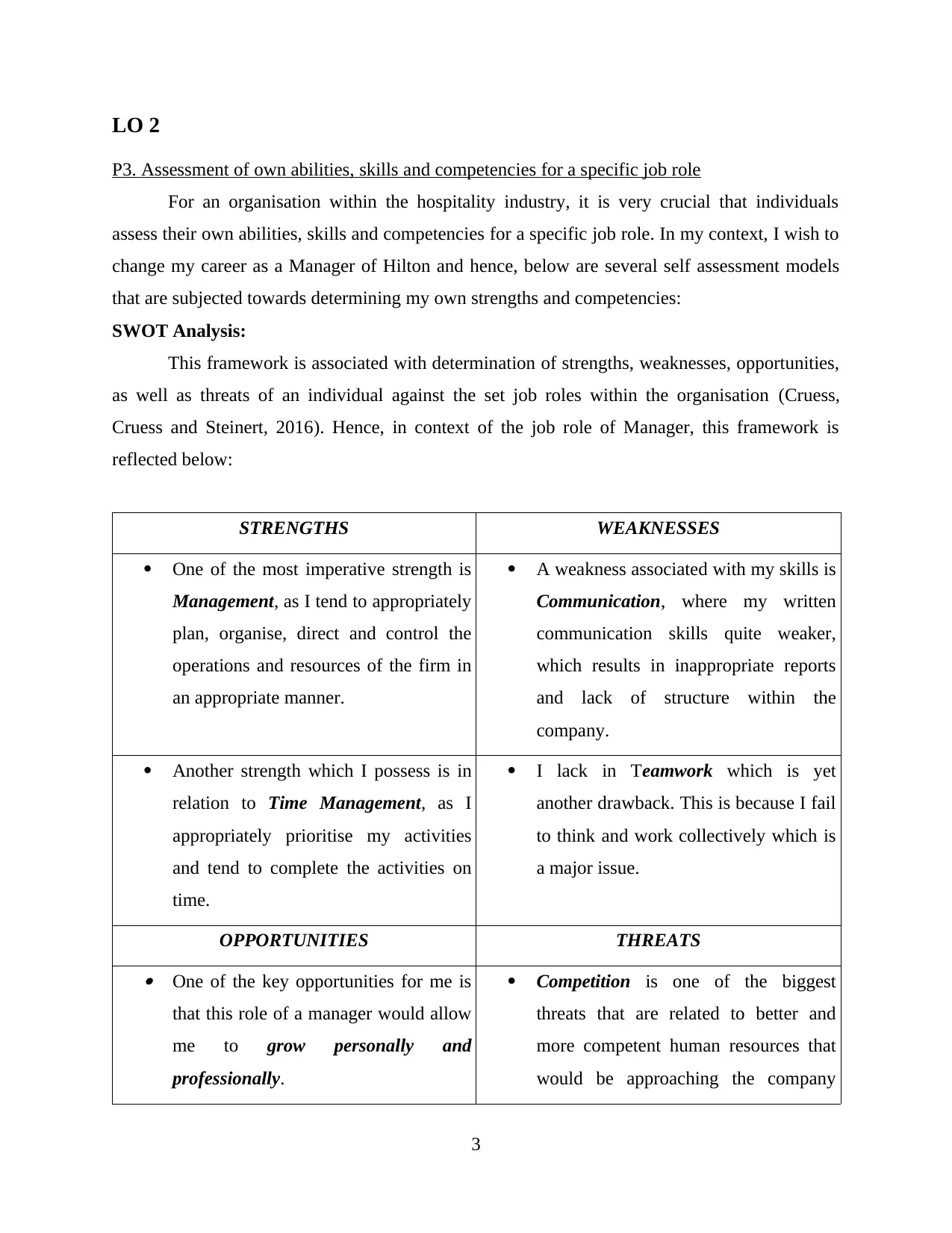
LO 2
P3. Assessment of own abilities, skills and competencies for a specific job role
For an organisation within the hospitality industry, it is very crucial that individuals
assess their own abilities, skills and competencies for a specific job role. In my context, I wish to
change my career as a Manager of Hilton and hence, below are several self assessment models
that are subjected towards determining my own strengths and competencies:
SWOT Analysis:
This framework is associated with determination of strengths, weaknesses, opportunities,
as well as threats of an individual against the set job roles within the organisation (Cruess,
Cruess and Steinert, 2016). Hence, in context of the job role of Manager, this framework is
reflected below:
STRENGTHS WEAKNESSES
One of the most imperative strength is
Management, as I tend to appropriately
plan, organise, direct and control the
operations and resources of the firm in
an appropriate manner.
A weakness associated with my skills is
Communication, where my written
communication skills quite weaker,
which results in inappropriate reports
and lack of structure within the
company.
Another strength which I possess is in
relation to Time Management, as I
appropriately prioritise my activities
and tend to complete the activities on
time.
I lack in Teamwork which is yet
another drawback. This is because I fail
to think and work collectively which is
a major issue.
OPPORTUNITIES THREATS One of the key opportunities for me is
that this role of a manager would allow
me to grow personally and
professionally.
Competition is one of the biggest
threats that are related to better and
more competent human resources that
would be approaching the company
3
P3. Assessment of own abilities, skills and competencies for a specific job role
For an organisation within the hospitality industry, it is very crucial that individuals
assess their own abilities, skills and competencies for a specific job role. In my context, I wish to
change my career as a Manager of Hilton and hence, below are several self assessment models
that are subjected towards determining my own strengths and competencies:
SWOT Analysis:
This framework is associated with determination of strengths, weaknesses, opportunities,
as well as threats of an individual against the set job roles within the organisation (Cruess,
Cruess and Steinert, 2016). Hence, in context of the job role of Manager, this framework is
reflected below:
STRENGTHS WEAKNESSES
One of the most imperative strength is
Management, as I tend to appropriately
plan, organise, direct and control the
operations and resources of the firm in
an appropriate manner.
A weakness associated with my skills is
Communication, where my written
communication skills quite weaker,
which results in inappropriate reports
and lack of structure within the
company.
Another strength which I possess is in
relation to Time Management, as I
appropriately prioritise my activities
and tend to complete the activities on
time.
I lack in Teamwork which is yet
another drawback. This is because I fail
to think and work collectively which is
a major issue.
OPPORTUNITIES THREATS One of the key opportunities for me is
that this role of a manager would allow
me to grow personally and
professionally.
Competition is one of the biggest
threats that are related to better and
more competent human resources that
would be approaching the company
3
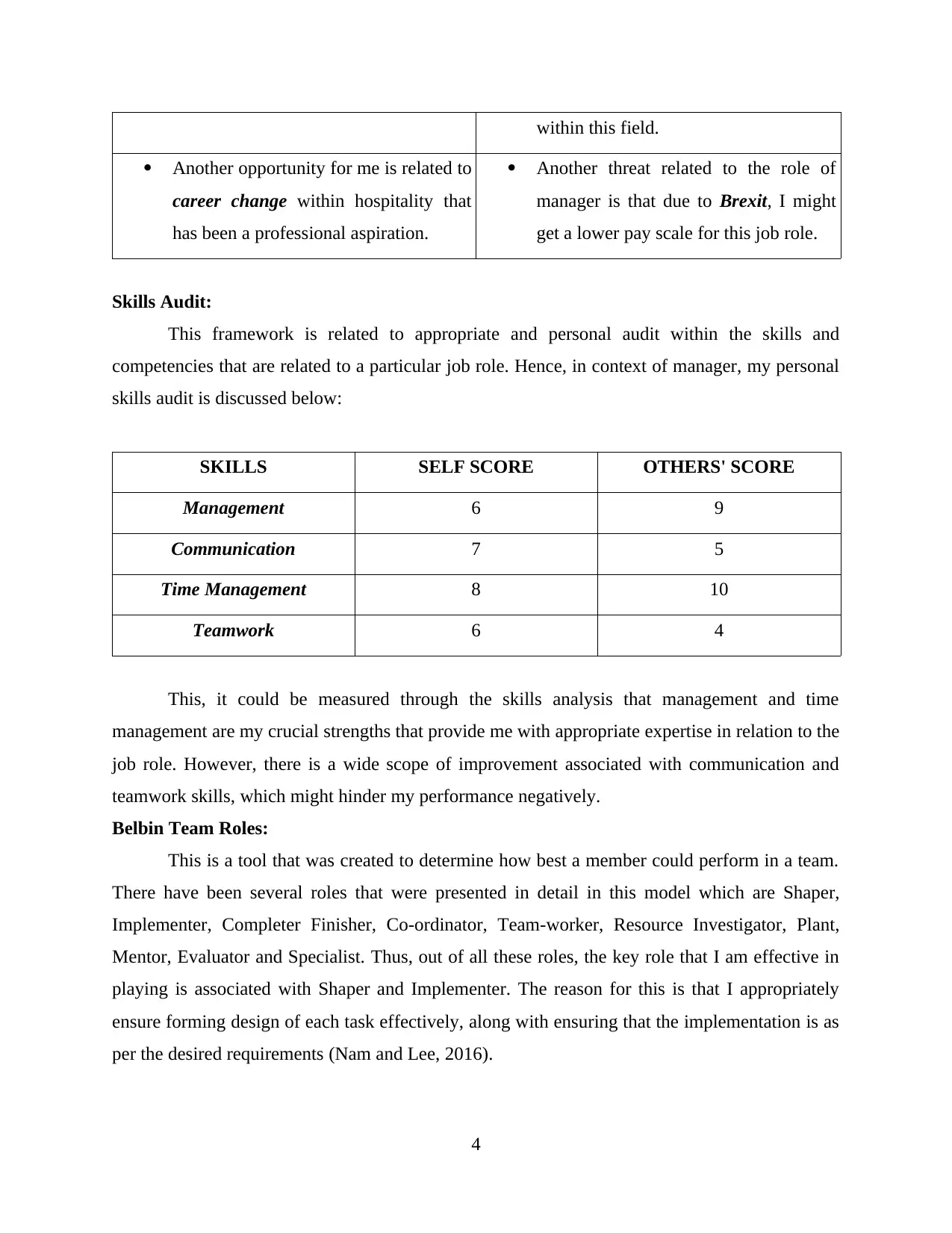
within this field.
Another opportunity for me is related to
career change within hospitality that
has been a professional aspiration.
Another threat related to the role of
manager is that due to Brexit, I might
get a lower pay scale for this job role.
Skills Audit:
This framework is related to appropriate and personal audit within the skills and
competencies that are related to a particular job role. Hence, in context of manager, my personal
skills audit is discussed below:
SKILLS SELF SCORE OTHERS' SCORE
Management 6 9
Communication 7 5
Time Management 8 10
Teamwork 6 4
This, it could be measured through the skills analysis that management and time
management are my crucial strengths that provide me with appropriate expertise in relation to the
job role. However, there is a wide scope of improvement associated with communication and
teamwork skills, which might hinder my performance negatively.
Belbin Team Roles:
This is a tool that was created to determine how best a member could perform in a team.
There have been several roles that were presented in detail in this model which are Shaper,
Implementer, Completer Finisher, Co-ordinator, Team-worker, Resource Investigator, Plant,
Mentor, Evaluator and Specialist. Thus, out of all these roles, the key role that I am effective in
playing is associated with Shaper and Implementer. The reason for this is that I appropriately
ensure forming design of each task effectively, along with ensuring that the implementation is as
per the desired requirements (Nam and Lee, 2016).
4
Another opportunity for me is related to
career change within hospitality that
has been a professional aspiration.
Another threat related to the role of
manager is that due to Brexit, I might
get a lower pay scale for this job role.
Skills Audit:
This framework is related to appropriate and personal audit within the skills and
competencies that are related to a particular job role. Hence, in context of manager, my personal
skills audit is discussed below:
SKILLS SELF SCORE OTHERS' SCORE
Management 6 9
Communication 7 5
Time Management 8 10
Teamwork 6 4
This, it could be measured through the skills analysis that management and time
management are my crucial strengths that provide me with appropriate expertise in relation to the
job role. However, there is a wide scope of improvement associated with communication and
teamwork skills, which might hinder my performance negatively.
Belbin Team Roles:
This is a tool that was created to determine how best a member could perform in a team.
There have been several roles that were presented in detail in this model which are Shaper,
Implementer, Completer Finisher, Co-ordinator, Team-worker, Resource Investigator, Plant,
Mentor, Evaluator and Specialist. Thus, out of all these roles, the key role that I am effective in
playing is associated with Shaper and Implementer. The reason for this is that I appropriately
ensure forming design of each task effectively, along with ensuring that the implementation is as
per the desired requirements (Nam and Lee, 2016).
4
⊘ This is a preview!⊘
Do you want full access?
Subscribe today to unlock all pages.

Trusted by 1+ million students worldwide
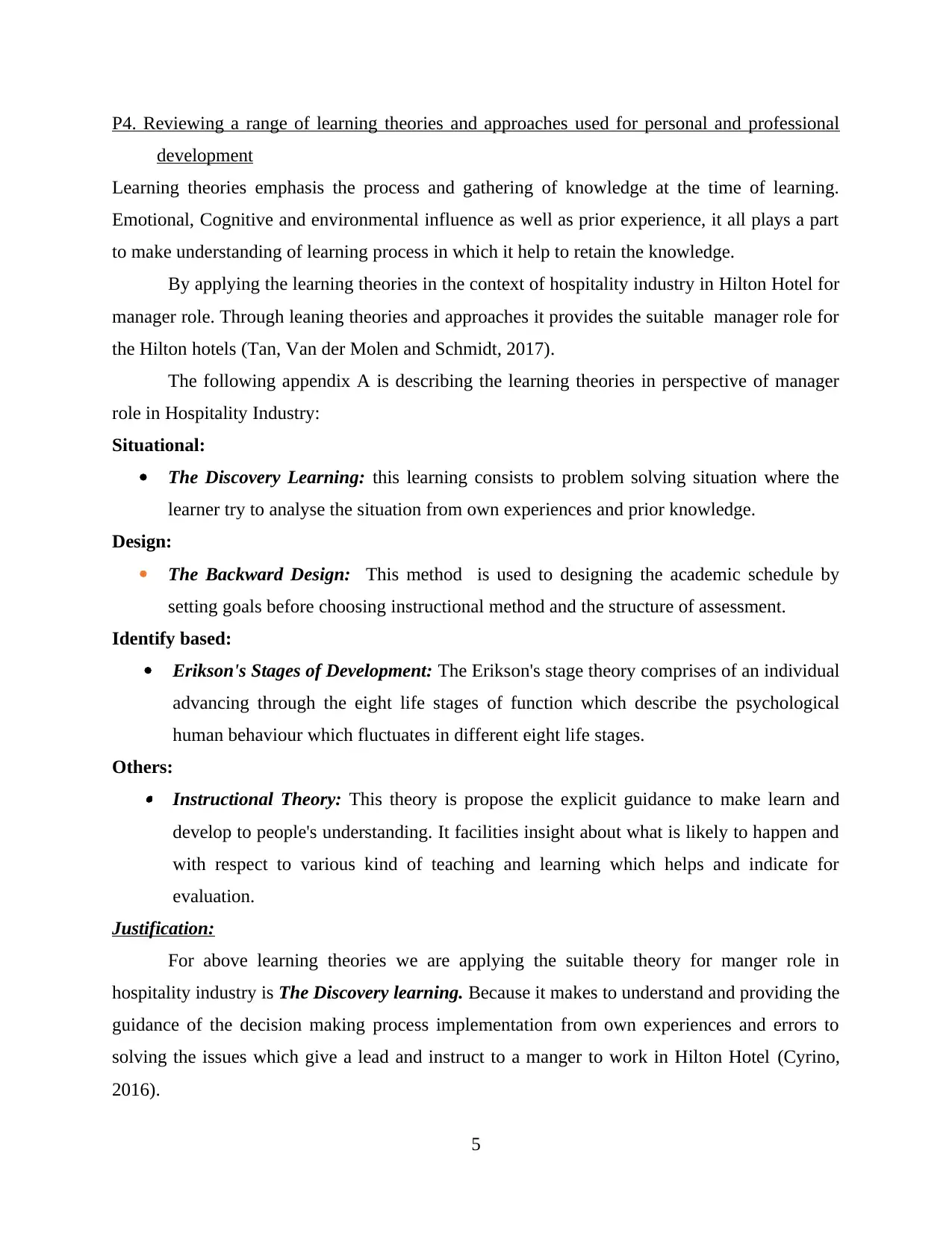
P4. Reviewing a range of learning theories and approaches used for personal and professional
development
Learning theories emphasis the process and gathering of knowledge at the time of learning.
Emotional, Cognitive and environmental influence as well as prior experience, it all plays a part
to make understanding of learning process in which it help to retain the knowledge.
By applying the learning theories in the context of hospitality industry in Hilton Hotel for
manager role. Through leaning theories and approaches it provides the suitable manager role for
the Hilton hotels (Tan, Van der Molen and Schmidt, 2017).
The following appendix A is describing the learning theories in perspective of manager
role in Hospitality Industry:
Situational:
The Discovery Learning: this learning consists to problem solving situation where the
learner try to analyse the situation from own experiences and prior knowledge.
Design:
The Backward Design: This method is used to designing the academic schedule by
setting goals before choosing instructional method and the structure of assessment.
Identify based:
Erikson's Stages of Development: The Erikson's stage theory comprises of an individual
advancing through the eight life stages of function which describe the psychological
human behaviour which fluctuates in different eight life stages.
Others: Instructional Theory: This theory is propose the explicit guidance to make learn and
develop to people's understanding. It facilities insight about what is likely to happen and
with respect to various kind of teaching and learning which helps and indicate for
evaluation.
Justification:
For above learning theories we are applying the suitable theory for manger role in
hospitality industry is The Discovery learning. Because it makes to understand and providing the
guidance of the decision making process implementation from own experiences and errors to
solving the issues which give a lead and instruct to a manger to work in Hilton Hotel (Cyrino,
2016).
5
development
Learning theories emphasis the process and gathering of knowledge at the time of learning.
Emotional, Cognitive and environmental influence as well as prior experience, it all plays a part
to make understanding of learning process in which it help to retain the knowledge.
By applying the learning theories in the context of hospitality industry in Hilton Hotel for
manager role. Through leaning theories and approaches it provides the suitable manager role for
the Hilton hotels (Tan, Van der Molen and Schmidt, 2017).
The following appendix A is describing the learning theories in perspective of manager
role in Hospitality Industry:
Situational:
The Discovery Learning: this learning consists to problem solving situation where the
learner try to analyse the situation from own experiences and prior knowledge.
Design:
The Backward Design: This method is used to designing the academic schedule by
setting goals before choosing instructional method and the structure of assessment.
Identify based:
Erikson's Stages of Development: The Erikson's stage theory comprises of an individual
advancing through the eight life stages of function which describe the psychological
human behaviour which fluctuates in different eight life stages.
Others: Instructional Theory: This theory is propose the explicit guidance to make learn and
develop to people's understanding. It facilities insight about what is likely to happen and
with respect to various kind of teaching and learning which helps and indicate for
evaluation.
Justification:
For above learning theories we are applying the suitable theory for manger role in
hospitality industry is The Discovery learning. Because it makes to understand and providing the
guidance of the decision making process implementation from own experiences and errors to
solving the issues which give a lead and instruct to a manger to work in Hilton Hotel (Cyrino,
2016).
5
Paraphrase This Document
Need a fresh take? Get an instant paraphrase of this document with our AI Paraphraser
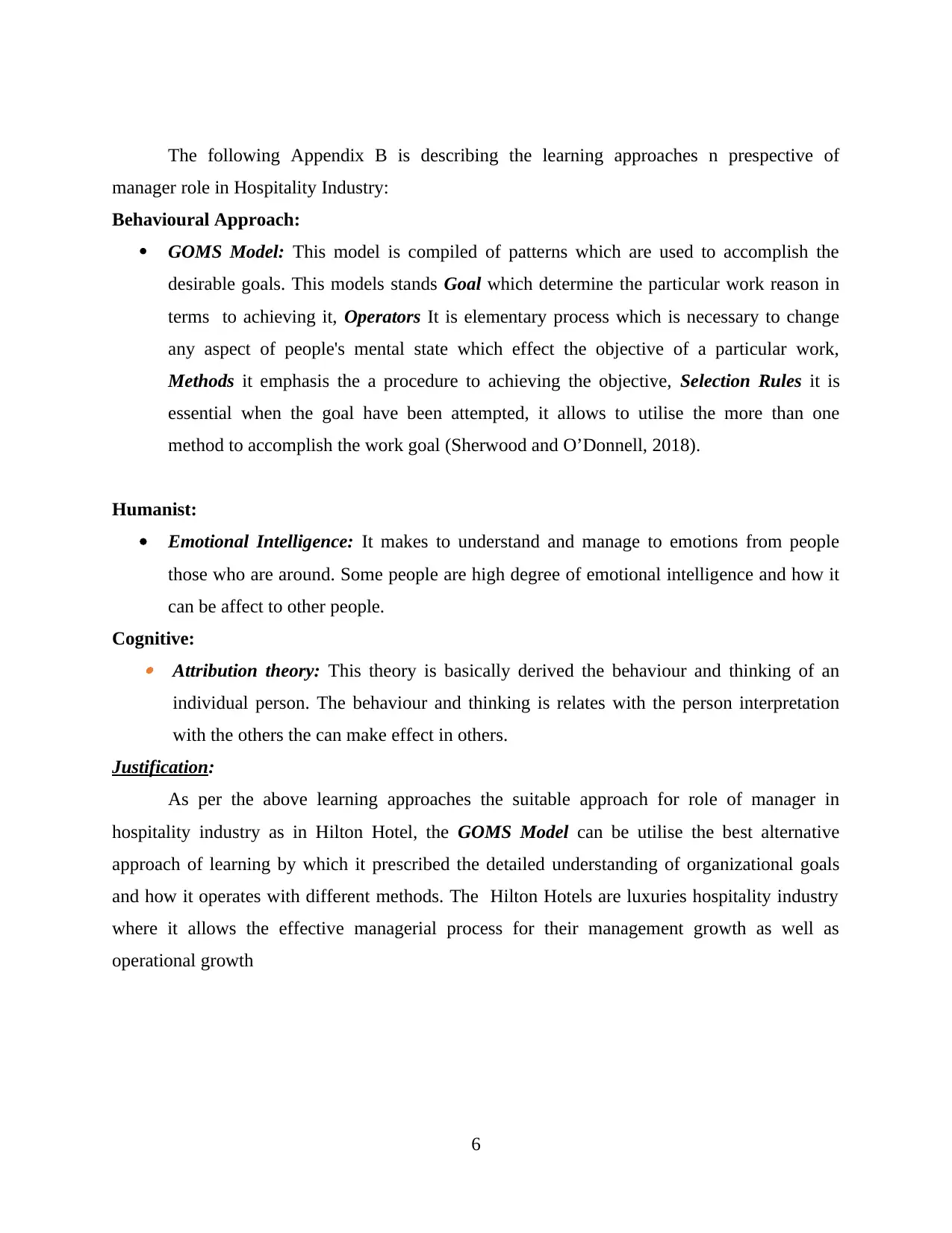
The following Appendix B is describing the learning approaches n prespective of
manager role in Hospitality Industry:
Behavioural Approach:
GOMS Model: This model is compiled of patterns which are used to accomplish the
desirable goals. This models stands Goal which determine the particular work reason in
terms to achieving it, Operators It is elementary process which is necessary to change
any aspect of people's mental state which effect the objective of a particular work,
Methods it emphasis the a procedure to achieving the objective, Selection Rules it is
essential when the goal have been attempted, it allows to utilise the more than one
method to accomplish the work goal (Sherwood and O’Donnell, 2018).
Humanist:
Emotional Intelligence: It makes to understand and manage to emotions from people
those who are around. Some people are high degree of emotional intelligence and how it
can be affect to other people.
Cognitive: Attribution theory: This theory is basically derived the behaviour and thinking of an
individual person. The behaviour and thinking is relates with the person interpretation
with the others the can make effect in others.
Justification:
As per the above learning approaches the suitable approach for role of manager in
hospitality industry as in Hilton Hotel, the GOMS Model can be utilise the best alternative
approach of learning by which it prescribed the detailed understanding of organizational goals
and how it operates with different methods. The Hilton Hotels are luxuries hospitality industry
where it allows the effective managerial process for their management growth as well as
operational growth
6
manager role in Hospitality Industry:
Behavioural Approach:
GOMS Model: This model is compiled of patterns which are used to accomplish the
desirable goals. This models stands Goal which determine the particular work reason in
terms to achieving it, Operators It is elementary process which is necessary to change
any aspect of people's mental state which effect the objective of a particular work,
Methods it emphasis the a procedure to achieving the objective, Selection Rules it is
essential when the goal have been attempted, it allows to utilise the more than one
method to accomplish the work goal (Sherwood and O’Donnell, 2018).
Humanist:
Emotional Intelligence: It makes to understand and manage to emotions from people
those who are around. Some people are high degree of emotional intelligence and how it
can be affect to other people.
Cognitive: Attribution theory: This theory is basically derived the behaviour and thinking of an
individual person. The behaviour and thinking is relates with the person interpretation
with the others the can make effect in others.
Justification:
As per the above learning approaches the suitable approach for role of manager in
hospitality industry as in Hilton Hotel, the GOMS Model can be utilise the best alternative
approach of learning by which it prescribed the detailed understanding of organizational goals
and how it operates with different methods. The Hilton Hotels are luxuries hospitality industry
where it allows the effective managerial process for their management growth as well as
operational growth
6
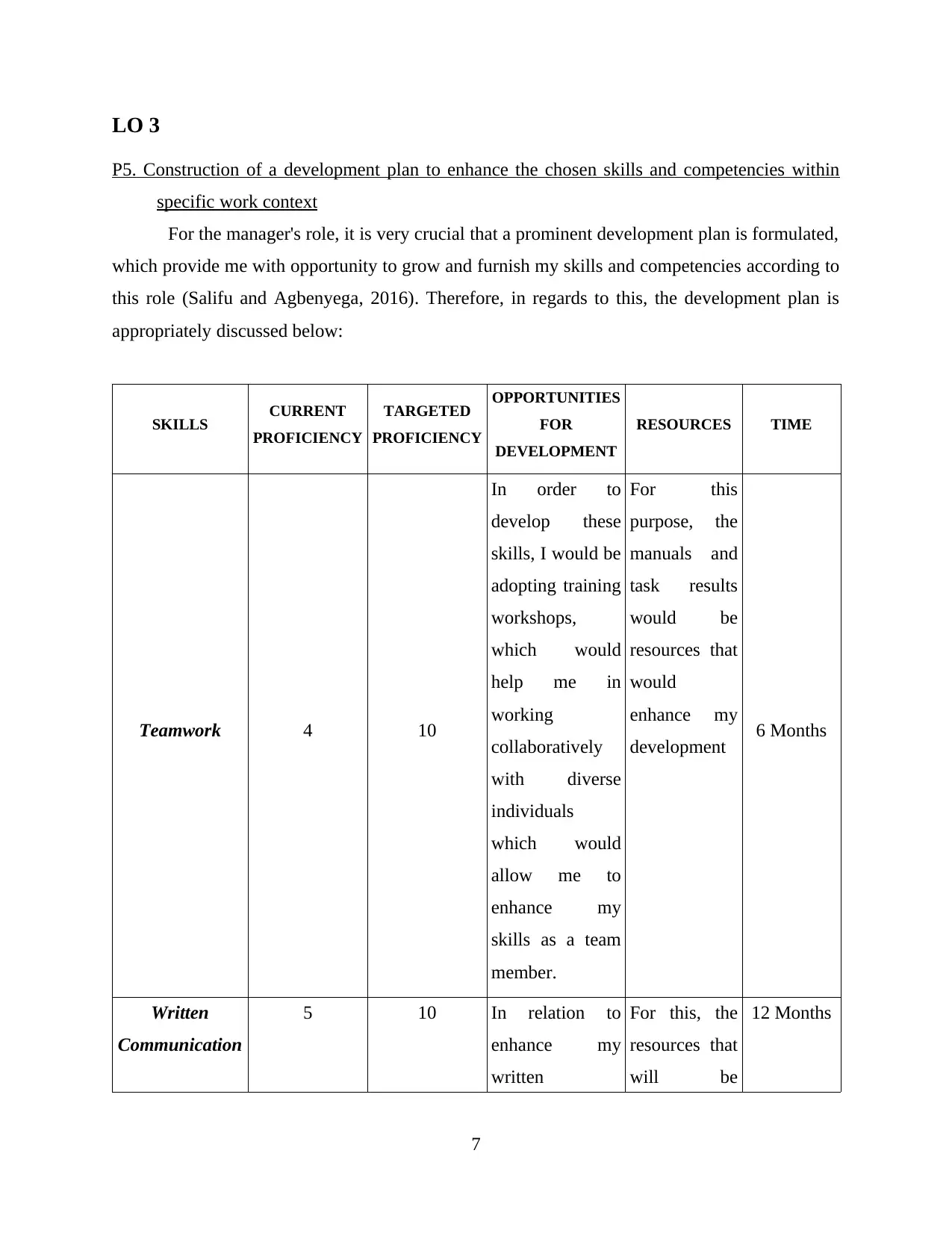
LO 3
P5. Construction of a development plan to enhance the chosen skills and competencies within
specific work context
For the manager's role, it is very crucial that a prominent development plan is formulated,
which provide me with opportunity to grow and furnish my skills and competencies according to
this role (Salifu and Agbenyega, 2016). Therefore, in regards to this, the development plan is
appropriately discussed below:
SKILLS CURRENT
PROFICIENCY
TARGETED
PROFICIENCY
OPPORTUNITIES
FOR
DEVELOPMENT
RESOURCES TIME
Teamwork 4 10
In order to
develop these
skills, I would be
adopting training
workshops,
which would
help me in
working
collaboratively
with diverse
individuals
which would
allow me to
enhance my
skills as a team
member.
For this
purpose, the
manuals and
task results
would be
resources that
would
enhance my
development 6 Months
Written
Communication
5 10 In relation to
enhance my
written
For this, the
resources that
will be
12 Months
7
P5. Construction of a development plan to enhance the chosen skills and competencies within
specific work context
For the manager's role, it is very crucial that a prominent development plan is formulated,
which provide me with opportunity to grow and furnish my skills and competencies according to
this role (Salifu and Agbenyega, 2016). Therefore, in regards to this, the development plan is
appropriately discussed below:
SKILLS CURRENT
PROFICIENCY
TARGETED
PROFICIENCY
OPPORTUNITIES
FOR
DEVELOPMENT
RESOURCES TIME
Teamwork 4 10
In order to
develop these
skills, I would be
adopting training
workshops,
which would
help me in
working
collaboratively
with diverse
individuals
which would
allow me to
enhance my
skills as a team
member.
For this
purpose, the
manuals and
task results
would be
resources that
would
enhance my
development 6 Months
Written
Communication
5 10 In relation to
enhance my
written
For this, the
resources that
will be
12 Months
7
⊘ This is a preview!⊘
Do you want full access?
Subscribe today to unlock all pages.

Trusted by 1+ million students worldwide
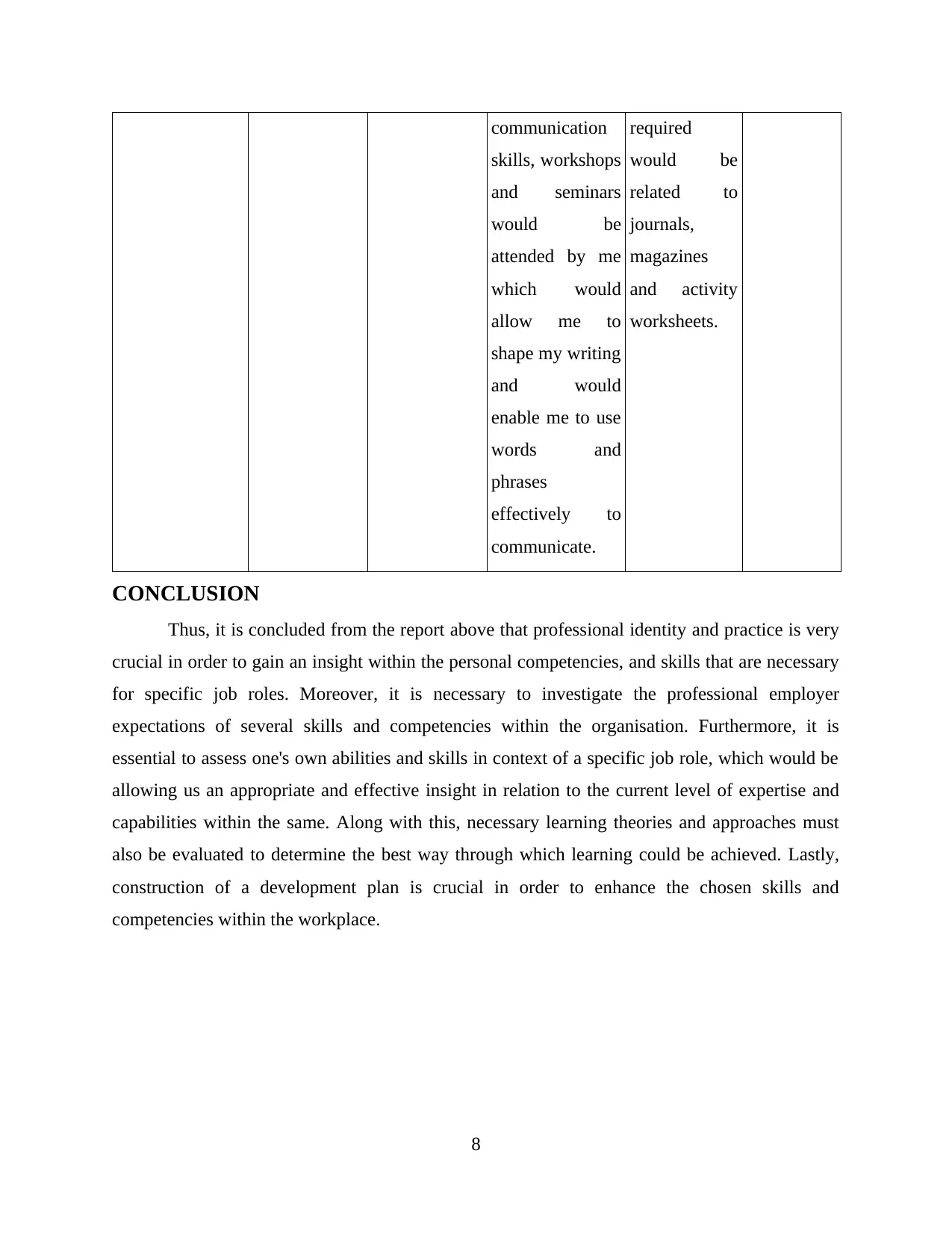
communication
skills, workshops
and seminars
would be
attended by me
which would
allow me to
shape my writing
and would
enable me to use
words and
phrases
effectively to
communicate.
required
would be
related to
journals,
magazines
and activity
worksheets.
CONCLUSION
Thus, it is concluded from the report above that professional identity and practice is very
crucial in order to gain an insight within the personal competencies, and skills that are necessary
for specific job roles. Moreover, it is necessary to investigate the professional employer
expectations of several skills and competencies within the organisation. Furthermore, it is
essential to assess one's own abilities and skills in context of a specific job role, which would be
allowing us an appropriate and effective insight in relation to the current level of expertise and
capabilities within the same. Along with this, necessary learning theories and approaches must
also be evaluated to determine the best way through which learning could be achieved. Lastly,
construction of a development plan is crucial in order to enhance the chosen skills and
competencies within the workplace.
8
skills, workshops
and seminars
would be
attended by me
which would
allow me to
shape my writing
and would
enable me to use
words and
phrases
effectively to
communicate.
required
would be
related to
journals,
magazines
and activity
worksheets.
CONCLUSION
Thus, it is concluded from the report above that professional identity and practice is very
crucial in order to gain an insight within the personal competencies, and skills that are necessary
for specific job roles. Moreover, it is necessary to investigate the professional employer
expectations of several skills and competencies within the organisation. Furthermore, it is
essential to assess one's own abilities and skills in context of a specific job role, which would be
allowing us an appropriate and effective insight in relation to the current level of expertise and
capabilities within the same. Along with this, necessary learning theories and approaches must
also be evaluated to determine the best way through which learning could be achieved. Lastly,
construction of a development plan is crucial in order to enhance the chosen skills and
competencies within the workplace.
8
Paraphrase This Document
Need a fresh take? Get an instant paraphrase of this document with our AI Paraphraser
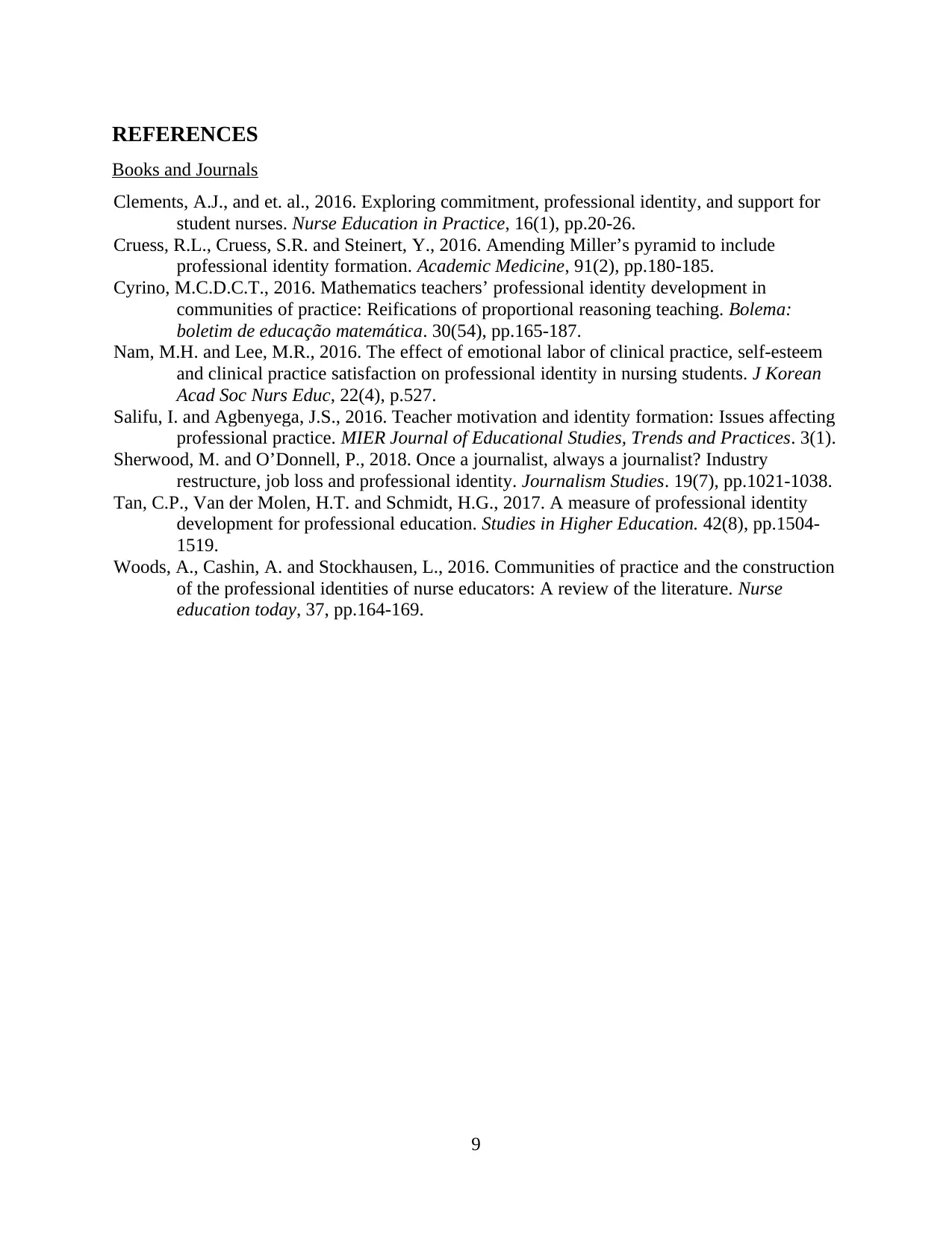
REFERENCES
Books and Journals
Clements, A.J., and et. al., 2016. Exploring commitment, professional identity, and support for
student nurses. Nurse Education in Practice, 16(1), pp.20-26.
Cruess, R.L., Cruess, S.R. and Steinert, Y., 2016. Amending Miller’s pyramid to include
professional identity formation. Academic Medicine, 91(2), pp.180-185.
Cyrino, M.C.D.C.T., 2016. Mathematics teachers’ professional identity development in
communities of practice: Reifications of proportional reasoning teaching. Bolema:
boletim de educação matemática. 30(54), pp.165-187.
Nam, M.H. and Lee, M.R., 2016. The effect of emotional labor of clinical practice, self-esteem
and clinical practice satisfaction on professional identity in nursing students. J Korean
Acad Soc Nurs Educ, 22(4), p.527.
Salifu, I. and Agbenyega, J.S., 2016. Teacher motivation and identity formation: Issues affecting
professional practice. MIER Journal of Educational Studies, Trends and Practices. 3(1).
Sherwood, M. and O’Donnell, P., 2018. Once a journalist, always a journalist? Industry
restructure, job loss and professional identity. Journalism Studies. 19(7), pp.1021-1038.
Tan, C.P., Van der Molen, H.T. and Schmidt, H.G., 2017. A measure of professional identity
development for professional education. Studies in Higher Education. 42(8), pp.1504-
1519.
Woods, A., Cashin, A. and Stockhausen, L., 2016. Communities of practice and the construction
of the professional identities of nurse educators: A review of the literature. Nurse
education today, 37, pp.164-169.
9
Books and Journals
Clements, A.J., and et. al., 2016. Exploring commitment, professional identity, and support for
student nurses. Nurse Education in Practice, 16(1), pp.20-26.
Cruess, R.L., Cruess, S.R. and Steinert, Y., 2016. Amending Miller’s pyramid to include
professional identity formation. Academic Medicine, 91(2), pp.180-185.
Cyrino, M.C.D.C.T., 2016. Mathematics teachers’ professional identity development in
communities of practice: Reifications of proportional reasoning teaching. Bolema:
boletim de educação matemática. 30(54), pp.165-187.
Nam, M.H. and Lee, M.R., 2016. The effect of emotional labor of clinical practice, self-esteem
and clinical practice satisfaction on professional identity in nursing students. J Korean
Acad Soc Nurs Educ, 22(4), p.527.
Salifu, I. and Agbenyega, J.S., 2016. Teacher motivation and identity formation: Issues affecting
professional practice. MIER Journal of Educational Studies, Trends and Practices. 3(1).
Sherwood, M. and O’Donnell, P., 2018. Once a journalist, always a journalist? Industry
restructure, job loss and professional identity. Journalism Studies. 19(7), pp.1021-1038.
Tan, C.P., Van der Molen, H.T. and Schmidt, H.G., 2017. A measure of professional identity
development for professional education. Studies in Higher Education. 42(8), pp.1504-
1519.
Woods, A., Cashin, A. and Stockhausen, L., 2016. Communities of practice and the construction
of the professional identities of nurse educators: A review of the literature. Nurse
education today, 37, pp.164-169.
9
1 out of 11
Related Documents
Your All-in-One AI-Powered Toolkit for Academic Success.
+13062052269
info@desklib.com
Available 24*7 on WhatsApp / Email
![[object Object]](/_next/static/media/star-bottom.7253800d.svg)
Unlock your academic potential
Copyright © 2020–2026 A2Z Services. All Rights Reserved. Developed and managed by ZUCOL.




